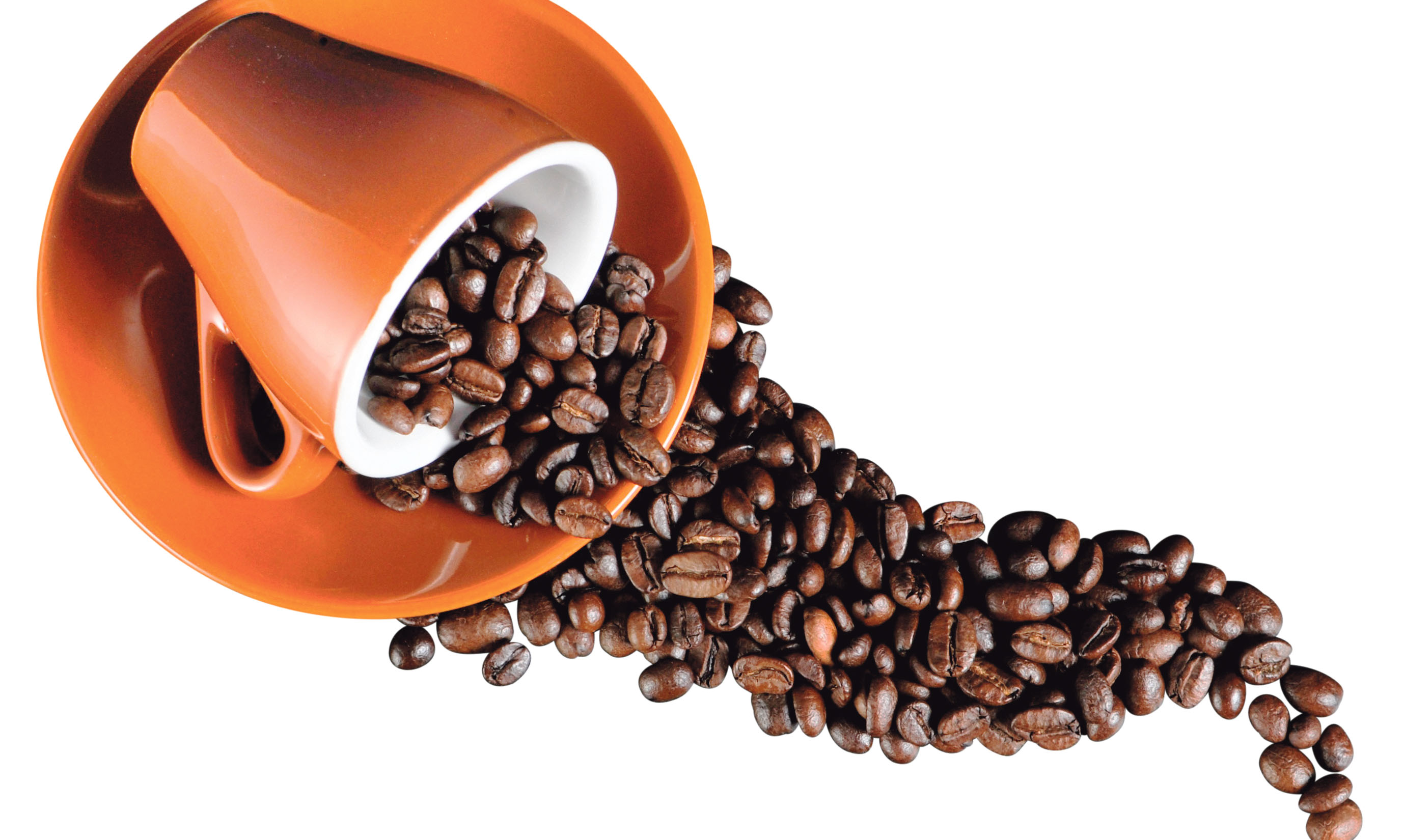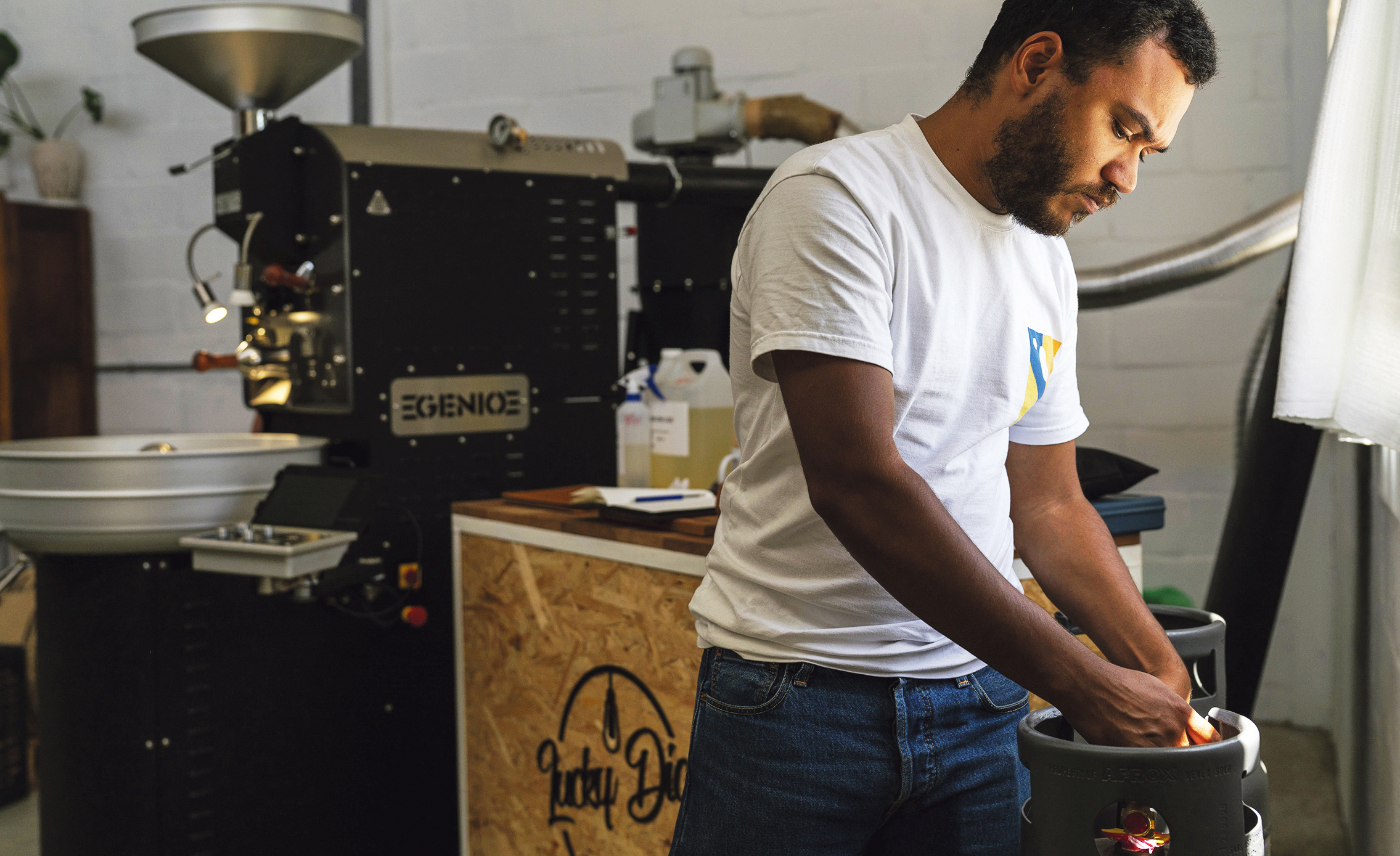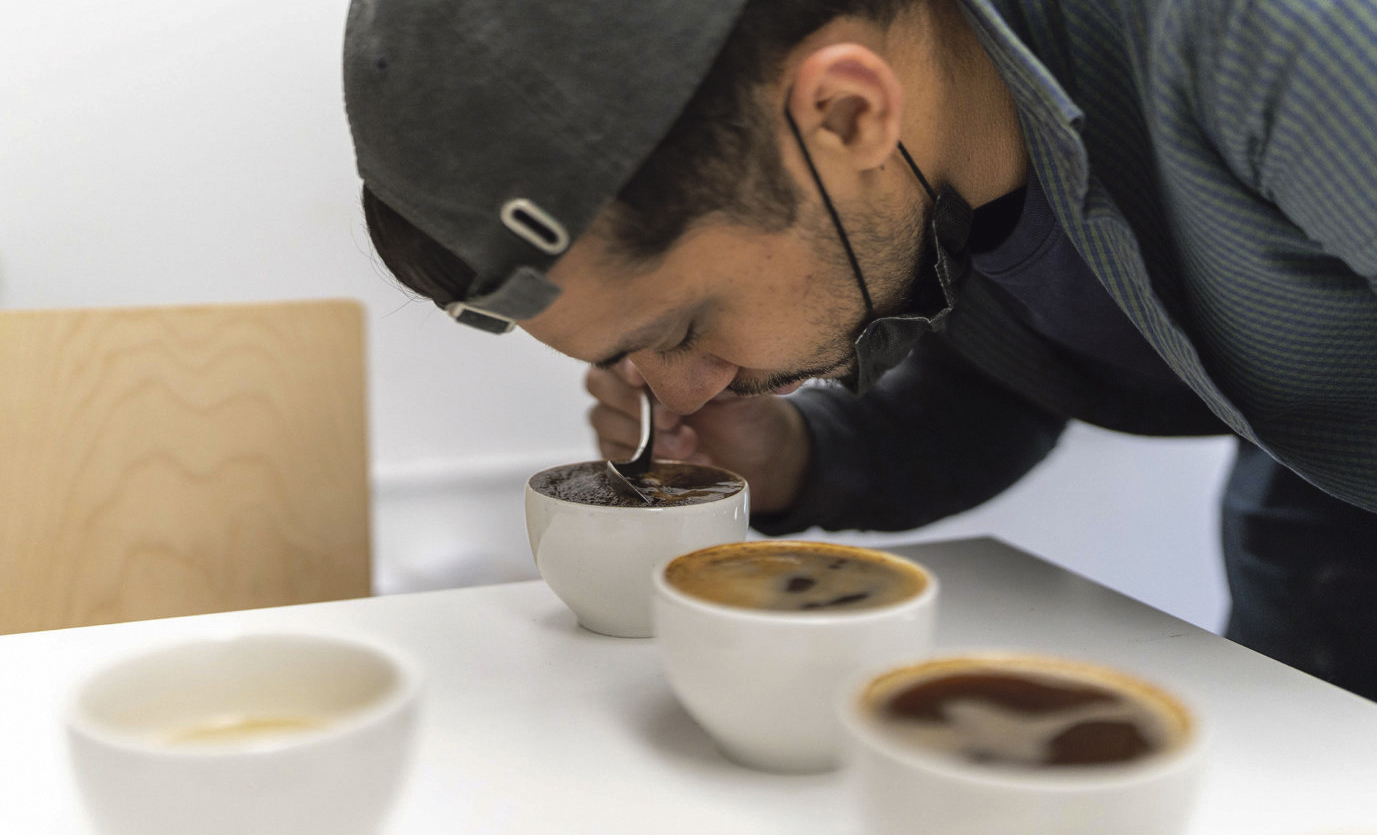Under a skylight, 10 unlabelled cups, each containing dry coffee grounds, line the edge of a large table at the premises of Cedar Coffee Roasters at Side Street Studios in Woodstock, Cape Town.
Leigh Wentzel (29) leans over the cups, one by one, taking in the coffee’s aroma. Each time he does this, the peak of his Palace hat obscures the cup from view. Halfway through the row of cups, he looks at Winston Thomas (31), cocks his head and says: “I think I know which coffees aren’t ours.”
They are “cupping” their newly roasted coffees, a process that includes taking in the aromas of the dry coffee grounds, the smell of the coffee grounds with water added and then, finally, tasting the infused coffee.
Of the 10 cups on the table, eight contain coffee Wentzel roasted a few days before. The remaining two cups contain “mystery coffee”. The cups are unlabelled to prevent the person doing the cupping from looking for certain flavour characteristics associated with the particular coffees. Instead, it is about detecting what is in each cup.
 Leigh Wentzel and Winston Thomas's success in the coffee world highlighted the fact that 'the gap between where we serve coffee and where we come from is so vast'. One of the reasons they started Cedar Coffee Roasters was to bridge that gap. (Photo: Rawpixel)
Leigh Wentzel and Winston Thomas's success in the coffee world highlighted the fact that 'the gap between where we serve coffee and where we come from is so vast'. One of the reasons they started Cedar Coffee Roasters was to bridge that gap. (Photo: Rawpixel)
At each step, the gathered information is cross-referenced with the memories of hundreds of coffees the duo have tasted in their cumulative 14 years in the industry, helping them to determine the quality of their recent roasts.
Wentzel and Thomas made their mark on South Africa’s speciality coffee world in October 2021 by launching Cedar, Cape Town’s newest speciality coffee roastery.
Cedar in the history of coffee
The recorded history of coffee goes back hundreds of years. The beans of the coffea arabica plant, which grows wild in Ethiopia, were first roasted and brewed in Yemen in the 1500s. From there it spread throughout the Islamic world and was known as Muslim wine.
When the Ottomans invaded Egypt, the beans made their way into the Ottoman empire and the first coffee houses appeared in Istanbul. The Ottomans introduced coffee to the Europeans and it became a luxury drink associated with the bourgeoisie.
In the 1700s, the Dutch and French started to grow coffee in their colonies. The Dutch coerced peasants into labour, while the French used chattel slaves. Europe became the primary importer of coffee beans and the colonies supplied them with those beans.
By 1850, Saint-Domingue (now Haiti), a French colony, was supplying more than half of the world’s coffee. When the slaves revolted, in what became the Haitian revolution, they burned the coffee plantations.
This had a drastic effect on the world’s coffee supply, with Brazil taking up 90% of the supply needs by the end of the century. Coffee production then consolidated in the Americas – Brazil is still the largest exporter of beans today.
With the increased cheap and exploitative production of coffee in the American colonies, prices dropped globally and coffee went from being a luxury good to a commodity, ushering in coffee’s first wave, which was characterised by poor-quality coffee and included the powdered coffee we know in South Africa.
Coffee’s second wave was characterised by Starbucks’ espresso-based and flavoured drinks, the introduction of information of region to coffees, and takeaway cups.
Finally, coffee’s third wave, renamed “speciality coffee”, is characterised by traceable, single-origin coffees, grown and harvested to a high standard, with beans measured to ensure optimal quality, and then roasted in such a way that the flavour characteristics are developed, often without the bitterness associated with darker roasts, and prepared by skilled baristas.
Origin story
Wentzel and Thomas fell in love with speciality coffee, but as they both grew up in working-class families designated as coloured by the apartheid government, their first introduction to coffee was Nestlé’s powdered chicory drink, Ricoffy.
Thomas says that while one of his aunts was known for making the best “moer-coffee” – ground coffee, simultaneously boiled and strained through a sack – his early memories of coffee are from camping trips at the beach with his family. They would braai for lunch, but in the mornings they would have coffee and sandwiches. “I didn’t like it because it was coffee, I liked it because it was nice!” he says.
Wentzel remembers having his first cup of coffee at aftercare as a child. He liked the sweetness of it. “Three sugars,” he says.
But the duo’s fascination with coffee only really began at university.
Wentzel, who was living on Cedar Road in Thornton with his family, used to take the train to the city centre on Saturdays with friends.
“We didn’t have much money so we would either buy something small to eat, or buy coffee,” he says. He ended up frequenting Origin Coffee Roasting, initially because he was fascinated by their bar, which looked like a miniature science lab, but he kept returning because their flat whites were really good. Eventually, the head roaster suggested that he try a single-origin filter coffee and that changed the drink for him.
 Leigh Wentzel roasts coffee off-site at Lucky Dice Coffee Roasters in Klapmuts. (Photo: Barry Christianson)
Leigh Wentzel roasts coffee off-site at Lucky Dice Coffee Roasters in Klapmuts. (Photo: Barry Christianson)
Thomas read an article in Strand’s local newspaper by a woman who claimed there was no good coffee in Somerset West.
“I thought I was drinking great coffee at the time,” he says, citing R5 KFC cappuccinos as his go-to drink. After doing some research, he found the top coffee shops in Cape Town and visited them. He ended up completing a barista course at Origin Roasting during his university holidays.
When Wentzel, who studied industrial psychology, and Thomas, who studied civil engineering, completed their undergraduate degrees, they both opted to work in coffee instead.
Wentzel went on to work at Rosetta Roastery, where he started as a driver, then became a barista, and finally settled as a roaster. Thomas worked as a barista at Origin Roasting, competed in a number of barista competitions and won African, South African (three times) and Western Cape barista championships.
Their respective successes in the coffee world highlighted an uncomfortable fact: “The gap between where we serve coffee and where we come from is so vast,” says Thomas. One of the reasons they started Cedar was to bridge that gap.
Starting a roastery
South African speciality coffee roasters can’t compete with the buying power of their European and North American counterparts, which means that when South African roasters want to buy coffee beans from Ethiopian producers, for instance, they have to do so through American or European importers, significantly increasing the cost and narrowing the selection available to them.
So why have Wentzel and Thomas taken the hard road of starting a speciality coffee roastery when they could easily turn a good profit selling commodity beans?
For one, they care about the source of their coffee beans. They want them to be traceable and ethically sourced. They want assurances that farmers and others along the production chain are paid fairly. And then, like their peers in the speciality coffee world, Wentzel and Thomas are coffee geeks. They thrive on finding beans with unique characteristics and experimenting with roasting and brewing methods to accentuate those characteristics.
Read about another coffee success story in Daily Maverick: “Drinking in the rich story of Humble Coffee”
But, unlike many of their peers in South African speciality coffee, they want to grow their customer base to incorporate people from similar backgrounds to their own by knocking down the barriers to entry.
“I think it’s that this type of coffee is so far removed from a lot of people’s daily lives, it’s like, it’s not accessible, it looks like something that doesn’t represent them,” says Thomas.
For Cedar, this meant creating a unique blend of lower-cost but still speciality-grade coffee that would work well as a milk-based drink, and would be familiar enough to act as a gateway to the roastery’s single-origin coffees.
“We made a blend with a lower range of speciality coffee. We’ve made it taste a certain way that the average person, who isn’t used to coffee, would find enjoyable,” says Thomas. As well as being more relatable to people who have not had much experience with speciality coffee, the price is lower than their single-origin offerings. With their blends they have been able to prove, as Wentzel says, that “speciality coffee doesn’t have to be a luxury good”.
In addition to the flavour and cost, the culture needs to change as well.
“A lot of our South African roasteries follow what’s happening in Europe and the States and for a long time we did the same thing. I got into coffee because I used to watch videos of coffee people in the States and in Europe, and I fell in love with the imagery and what it looked like to be a barista,” says Thomas.
Cedar has begun to change the conversation by decoupling speciality coffee from European- and American-style coffee shops, underlining the fact that more people seem to be brewing coffee in their homes, a trend Wentzel says has been growing since the pandemic when coffee shops were closed.
Their hope is to see changes happen on the level of restaurants and coffee shops as well. “Imagine if there were cafés owned by aunties or gogos with hearty personalities, spaces where people could come together and experience nice food and coffee,” says Thomas.
Their vision goes beyond transforming the South African culture around coffee. “We want to be recognised as an African roastery,” says Thomas.
They are at the start of their journey but have been making a splash in the coffee industry with their top-quality coffees and approachable personalities, and while they work towards realising their ultimate vision, they continue to bring their unique experiences into the coffee they source and roast. The culmination of this is a cup of coffee. And Wentzel says: “The best thing someone can say is that our coffee tastes nice.” DM168
This article was first published by New Frame.
This story appeared in our weekly Daily Maverick 168 newspaper, which is available countrywide for R25.





 Leigh Wentzel roasts coffee off-site at Lucky Dice Coffee Roasters in Klapmuts. (Photo: Barry Christianson) FOR ONCE OFF USE ONLY
Leigh Wentzel roasts coffee off-site at Lucky Dice Coffee Roasters in Klapmuts. (Photo: Barry Christianson) FOR ONCE OFF USE ONLY 